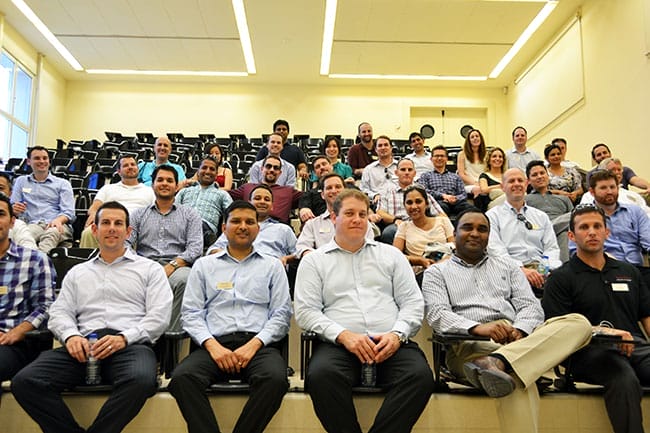I’ve gone on a few international trips with Wharton through the Global Modular Courses (GMCs) and the Wharton Leadership Ventures, and my motivation for each trip has been to learn about a completely new country and dive deeper into diverse and interesting subjects. For the mandatory [Wharton MBA for Executives] International Trip, I chose Spain because of its overarching themes of tourism, gastronomy and sports.
I had previously done an in-depth case study for a Marketing course on elBulli, one of Spain’s top gastronomy restaurants founded by world-famous chef Ferran Adrià. That background intrigued me to meet Carme Ruscalleda, the world’s only five-Michelin-starred female chef. As for sports, Spain is a leader in football (soccer) with FC Barcelona, a.k.a. Barça, and Real Madrid. Further, over 62 billion euros of the country’s GDP comes from tourism, which is quite substantial. I was also eager to learn more about this hot spot for tapas, flamenco, and architecture.
The trip began in Barcelona where we met with the CEO of Barcelona Tourism and visited the Camp Nou, Barça football stadium. It was thought provoking to witness the impact that hosting the Olympics in 1992 has made on this city. We had conversations in small groups about possible U.S. cities’ strategies going forward to win a bid to host the Olympics. If a tier-B American city can host the Olympics, it’s a way to put that city on the world map and take it to the next level in terms of economic development.

Chef Carme Ruscalleda. Photo credit: Raj Bharti.
Another highlight from Barcelona was meeting the famous chef Carme Ruscalleda. She runs an exceptionally cozy restaurant outside of Barcelona with a five-month waitlist for reservations. Ruscalleda talked about how she collaborates with various organizations to build her international brand, and she gave us advice for anti-aging: Eat fresh, eat local, eat organic and choose a profession you love! To top it all, seeing Gaudi’s remarkable work at the Sagrada Família, visiting the Santa Maria de Montserrat Abbey and walking on stunning beaches added extra spice.
After taking the high-speed train to Madrid, we met with Enrique Peña, WG’07, who is the chief of staff for the high-speed train. Peña is changing the face of the nation by building a massive infrastructure, and he is a key member on the high-speed rail project in Saudi Arabia. We visited the central office and got to see the control rooms for the nationwide network.
Outside Madrid, we visited O. Fournier wines, a successful winery launched by José Manuel Ortega Gil-Fournier, W’89, C’89, and his passionate sister Natalia Ortega Gil-Fournier. Empirical evidence suggests that wineries do not make much money for at least a generation, but this duo has found great success at their home front in Spain and established even bigger operations in Argentina.
We also met with Secretary of State for Commerce Jaime García Legaz. That was an incredible visit because Wharton students asked some tough questions about bureaucracy, corruption and other challenges facing Spain. We appreciated the rarity of someone in his position being so forthright, welcoming and engaging.

Wharton executive MBAs students go to Spain.
With 50 Wharton executive MBA (EMBA) students on the trip from both coasts, another high point was meeting many of my East Coast peers. It was a huge benefit, especially since I’m spending the current semester in Philadelphia along with eight other San Francisco classmates. I was able to build many new relationships and even formed a team with two other classmates for an entrepreneurship elective.
During the trip, we had the advantage of having two Spain insiders with us: Prof. Mauro F. Guillén, Wharton’s Dr. Felix Zandman Professor and director of the Lauder Institute, and Mireia Lizandra, an independent international sports consultant and Lauder partner. Their loyalty to Real Madrid and Barça, respectively, created stimulating conversations and memorable moments. And Wharton EMBA staff members Bernie Birt and Cathy Molony did a great job charting out the trip and bringing both coasts together.
Overall, the Spain trip was amazing. I have taken some similarly structured trips to Japan and China as Wharton GMCs [read Raj’s post about his Wharton GMC to Japan here], so I realize how valuable this type of immersive learning experience is. It gives students a broader exposure to different countries, cultures and lines of business, and opportunities to create and deepen relationships. Among many other things at Wharton, the Spain trip has become a highlight of my EMBA program.
My advice to other students is to take as many of these international trips as you can at Wharton and get out of your comfort zone. Adiós!
Editor’s note: This post originally appeared on the Wharton EMBA Blog on Oct. 7, 2014.


























